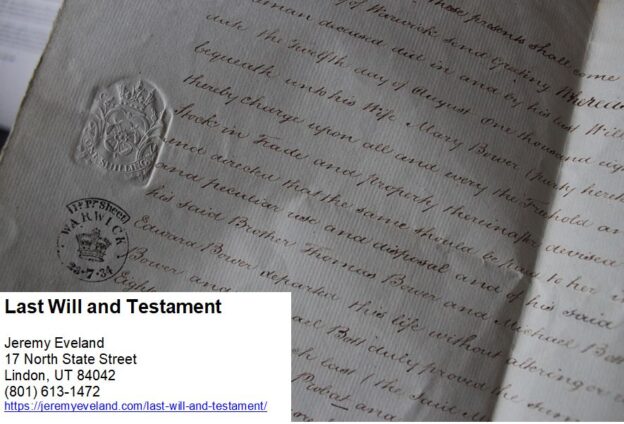-
Attorney at Law
- Introduction
- What Are the Legal Requirements for Revoking a Trust?
- How to Avoid Common Mistakes When Revoking a Trust
- What Are the Benefits of Revoking a Trust?
- What Are the Consequences of Revoking a Trust?
- How to Revoke a Trust: What You Need to Do
- The Process of Revoking a Trust: Step-by-Step Guide
- Understanding the Revocation of a Trust: What You Need to Know
- Why You Should Hire An Estate Lawyer When Revoking A Trust
“Secure Your Future with Revocation of a Trust – Protect Your Assets Today!”
Introduction
Revocation of a trust is a legal process that terminates a trust agreement and all of its associated rights and obligations. It is a complex process that requires the trustor, or the person who created the trust, to take certain steps to ensure that the trust is properly revoked. The revocation of a trust can have serious implications for the beneficiaries of the trust, so it is important to understand the process and the potential consequences before taking any action. This article will provide an overview of the revocation of a trust, including the steps involved and the potential consequences.
What Are the Legal Requirements for Revoking a Trust?
Revoking a trust is a serious decision that should not be taken lightly. It is important to understand the legal requirements for revoking a trust before taking any action.
The first step in revoking a trust is to determine if the trust is revocable or irrevocable. A revocable trust can be revoked at any time by the grantor, while an irrevocable trust cannot be revoked without the consent of all beneficiaries.
If the trust is revocable, the grantor must take certain steps to revoke the trust. The grantor must execute a written document that clearly states their intention to revoke the trust. This document must be signed by the grantor and witnessed by two individuals who are not beneficiaries of the trust. The document must also be filed with the court that issued the trust.
In addition, the grantor must notify all beneficiaries of the trust of their intention to revoke the trust. This notification must be in writing and must include a copy of the revocation document.
Finally, the grantor must take steps to distribute the assets of the trust according to the terms of the trust. This may include liquidating assets, transferring assets to beneficiaries, or transferring assets to another trust.
Revoking a trust is a complex process and should not be undertaken without the assistance of a qualified attorney. An attorney can help ensure that all legal requirements are met and that the trust is properly revoked.
How to Avoid Common Mistakes When Revoking a Trust
When revoking a trust, it is important to take the necessary steps to ensure that the trust is properly revoked. To avoid common mistakes, here are some tips to keep in mind:
1. Make sure to follow the instructions in the trust document. The trust document should provide clear instructions on how to revoke the trust. Make sure to follow these instructions carefully.
2. Ensure that all parties involved are notified. All parties involved in the trust should be notified of the revocation. This includes the trustee, the beneficiaries, and any other parties that may be affected by the revocation.
3. File the revocation with the court. Depending on the type of trust, it may be necessary to file the revocation with the court. This is especially important if the trust is a revocable trust.
4. Make sure to keep a copy of the revocation. It is important to keep a copy of the revocation for your records. This will help ensure that the trust is properly revoked and that all parties involved are aware of the revocation.
5. Consult with an attorney. If you are unsure of how to properly revoke a trust, it is best to consult with an attorney. An attorney can provide guidance and advice on how to properly revoke a trust.
By following these tips, you can help ensure that the trust is properly revoked and that all parties involved are aware of the revocation.
What Are the Benefits of Revoking a Trust?
Revoking a trust can be beneficial in certain situations. Revoking a trust allows the grantor to regain control of the assets that were placed in the trust. This can be beneficial if the grantor needs to access the assets for personal use or if the trust is no longer necessary. Additionally, revoking a trust can help to reduce the grantor’s tax burden. When a trust is revoked, the assets are no longer subject to the trust’s tax obligations. This can help to reduce the grantor’s overall tax liability.
Revoking a trust can also be beneficial if the grantor wishes to make changes to the trust. Revoking the trust allows the grantor to make changes to the trust document without having to create a new trust. This can be beneficial if the grantor wishes to make changes to the beneficiaries or the terms of the trust.
Finally, revoking a trust can be beneficial if the grantor wishes to terminate the trust. This can be beneficial if the trust is no longer necessary or if the grantor wishes to terminate the trust for any other reason. Revoking a trust allows the grantor to terminate the trust without having to go through the process of creating a new trust.
What Are the Consequences of Revoking a Trust?
Revoking a trust can have serious consequences, depending on the type of trust and the circumstances surrounding the revocation. Generally, revoking a trust will terminate the trust and all of its associated rights and obligations. This means that the trust assets will be returned to the grantor, the person who created the trust, and the beneficiaries will no longer have any rights to the trust assets.
In addition, revoking a trust can have tax implications. Depending on the type of trust, the grantor may be liable for taxes on the trust assets. For example, if the trust is a revocable living trust, the grantor may be liable for income taxes on any income generated by the trust assets. Furthermore, if the trust is an irrevocable trust, the grantor may be liable for gift taxes on any assets transferred to the trust.
Finally, revoking a trust can have legal implications. Depending on the type of trust, the grantor may be liable for any debts or obligations associated with the trust. For example, if the trust is a special needs trust, the grantor may be liable for any unpaid medical bills or other expenses associated with the trust.
In summary, revoking a trust can have serious consequences, including tax and legal implications. It is important to consult with a qualified attorney before revoking a trust to ensure that all of the potential consequences are understood.
How to Revoke a Trust: What You Need to Do
Revoking a trust is a serious decision that should not be taken lightly. It is important to understand the implications of revoking a trust and to ensure that all legal requirements are met. This article will provide an overview of the steps that need to be taken in order to revoke a trust.
1. Consult a lawyer. Before revoking a trust, it is important to consult a lawyer to ensure that all legal requirements are met. A lawyer can provide advice on the best way to proceed and can help to ensure that the trust is revoked in accordance with the law.
2. Prepare the necessary documents. In order to revoke a trust, certain documents must be prepared. These documents include a revocation document, which must be signed by the settlor (the person who created the trust) and any other trustees. The document must also be witnessed and notarized.
3. Notify the beneficiaries. Once the revocation document has been prepared, it is important to notify the beneficiaries of the trust. This can be done in writing or by other means, such as email or telephone.
4. File the revocation document. The revocation document must be filed with the court in order for the trust to be legally revoked. The court will then issue an order revoking the trust.
5. Distribute the trust assets. Once the trust has been revoked, the assets must be distributed in accordance with the terms of the trust. This may involve selling assets, transferring them to beneficiaries, or distributing them in other ways.
Revoking a trust is a serious decision that should not be taken lightly. It is important to understand the implications of revoking a trust and to ensure that all legal requirements are met. By following the steps outlined above, you can ensure that the trust is revoked in accordance with the law.
The Process of Revoking a Trust: Step-by-Step Guide
Step 1: Consult with an Attorney: Before revoking a trust, it is important to consult with an attorney to ensure that all legal requirements are met. An attorney can provide advice on the best way to proceed and can help ensure that the trust is properly revoked.
Step 2: Prepare the Revocation Document: The trust must be revoked in writing. The document should include the name of the trust, the date of the trust, the name of the trustee, and the name of the settlor. The document should also include a statement that the trust is being revoked and the date of the revocation.
Step 3: Sign the Revocation Document: The revocation document must be signed by the settlor and any other parties who have an interest in the trust. The document should also be notarized.
Step 4: File the Revocation Document: The revocation document should be filed with the court that issued the trust. This will ensure that the revocation is legally binding.
Step 5: Notify Beneficiaries: Once the revocation document has been filed, the settlor should notify all beneficiaries of the trust of the revocation. This will ensure that they are aware of the change and can take any necessary steps to protect their interests.
Step 6: Distribute Assets: Once the revocation document has been filed and the beneficiaries have been notified, the trustee should begin the process of distributing the assets of the trust according to the terms of the trust.
Step 7: Close the Trust: Once all assets have been distributed, the trustee should close the trust and file the appropriate paperwork with the court. This will ensure that the trust is officially revoked and no longer in effect.
Understanding the Revocation of a Trust: What You Need to Know
Trusts are a common estate planning tool used to protect assets and provide for the future of beneficiaries. However, there are times when a trust must be revoked. Understanding the revocation of a trust is important for anyone involved in the trust, including the grantor, trustee, and beneficiaries.
When a trust is revoked, it is no longer valid and all assets held in the trust are returned to the grantor. The grantor is the person who created the trust and is responsible for its management. The trustee is the person appointed by the grantor to manage the trust and distribute assets to the beneficiaries. The beneficiaries are the people who receive the assets from the trust.
The grantor has the right to revoke a trust at any time. This can be done by signing a revocation document or by filing a petition with the court. The revocation document must be signed by the grantor and witnessed by two people. The petition must be filed with the court and must include a statement of the reasons for the revocation.
Once the trust is revoked, the trustee must take steps to return all assets held in the trust to the grantor. This includes any investments, real estate, or other assets held in the trust. The trustee must also notify all beneficiaries of the revocation and provide them with a copy of the revocation document.
The revocation of a trust can have serious consequences for the grantor, trustee, and beneficiaries. It is important to understand the implications of revoking a trust before taking any action. Consulting with an experienced estate planning attorney can help ensure that all parties understand their rights and obligations.
Why You Should Hire An Estate Lawyer When Revoking A Trust
When revoking a trust, it is important to understand the legal implications of such an action. An estate lawyer can provide invaluable assistance in navigating the complexities of the process. Here are some of the reasons why you should hire an estate lawyer when revoking a trust.
First, an estate lawyer can help you understand the legal requirements for revoking a trust. Depending on the type of trust, there may be specific steps that must be taken in order to properly revoke it. An estate lawyer can help you understand the requirements and ensure that you are following the correct procedure.
Second, an estate lawyer can help you understand the potential tax implications of revoking a trust. Depending on the type of trust, there may be tax consequences that you need to be aware of. An estate lawyer can help you understand the potential tax implications and ensure that you are taking the necessary steps to minimize any potential tax liability.
Third, an estate lawyer can help you understand the potential implications of revoking a trust on other parties. Depending on the type of trust, there may be other parties who have an interest in the trust, such as beneficiaries or creditors. An estate lawyer can help you understand the potential implications of revoking a trust on these parties and ensure that their interests are protected.
Finally, an estate lawyer can help you understand the potential implications of revoking a trust on your own estate. Depending on the type of trust, there may be implications for your own estate planning. An estate lawyer can help you understand the potential implications of revoking a trust on your own estate and ensure that your estate plan is properly updated.
Overall, hiring an estate lawyer when revoking a trust is an important step in the process. An estate lawyer can provide invaluable assistance in understanding the legal requirements, potential tax implications, and potential implications on other parties and your own estate.
Areas We Serve
We serve individuals and businesses in the following locations:
Salt Lake City Utah
West Valley City Utah
Provo Utah
West Jordan Utah
Orem Utah
Sandy Utah
Ogden Utah
St. George Utah
Layton Utah
South Jordan Utah
Lehi Utah
Millcreek Utah
Taylorsville Utah
Logan Utah
Murray Utah
Draper Utah
Bountiful Utah
Riverton Utah
Herriman Utah
Spanish Fork Utah
Roy Utah
Pleasant Grove Utah
Kearns Utah
Tooele Utah
Cottonwood Heights Utah
Midvale Utah
Springville Utah
Eagle Mountain Utah
Cedar City Utah
Kaysville Utah
Clearfield Utah
Holladay Utah
American Fork Utah
Syracuse Utah
Saratoga Springs Utah
Magna Utah
Washington Utah
South Salt Lake Utah
Farmington Utah
Clinton Utah
North Salt Lake Utah
Payson Utah
North Ogden Utah
Brigham City Utah
Highland Utah
Centerville Utah
Hurricane Utah
South Ogden Utah
Heber Utah
West Haven Utah
Bluffdale Utah
Santaquin Utah
Smithfield Utah
Woods Cross Utah
Grantsville Utah
Lindon Utah
North Logan Utah
West Point Utah
Vernal Utah
Alpine Utah
Cedar Hills Utah
Pleasant View Utah
Mapleton Utah
Stansbury Par Utah
Washington Terrace Utah
Riverdale Utah
Hooper Utah
Tremonton Utah
Ivins Utah
Park City Utah
Price Utah
Hyrum Utah
Summit Park Utah
Salem Utah
Richfield Utah
Santa Clara Utah
Providence Utah
South Weber Utah
Vineyard Utah
Ephraim Utah
Roosevelt Utah
Farr West Utah
Plain City Utah
Nibley Utah
Enoch Utah
Harrisville Utah
Snyderville Utah
Fruit Heights Utah
Nephi Utah
White City Utah
West Bountiful Utah
Sunset Utah
Moab Utah
Midway Utah
Perry Utah
Kanab Utah
Hyde Park Utah
Silver Summit Utah
La Verkin Utah
Morgan Utah
Probate Lawyer Murray Utah Consultation
When you need help from a Probate Lawyer in Murray Utah call Jeremy D. Eveland, MBA, JD (801) 613-1472 for a consultation.
Jeremy Eveland
17 North State Street
Lindon UT 84042
(801) 613-1472
Related Posts
Business Succession Lawyer Spanish Fork Utah
Corporate Attorney St. George Utah
Business Strategy and Consulting
Business Succession Lawyer Roy Utah
Business Lawyer St George Utah
Estate Planning Lawyer Ogden Utah
Business Succession Lawyer Pleasant Grove Utah


















